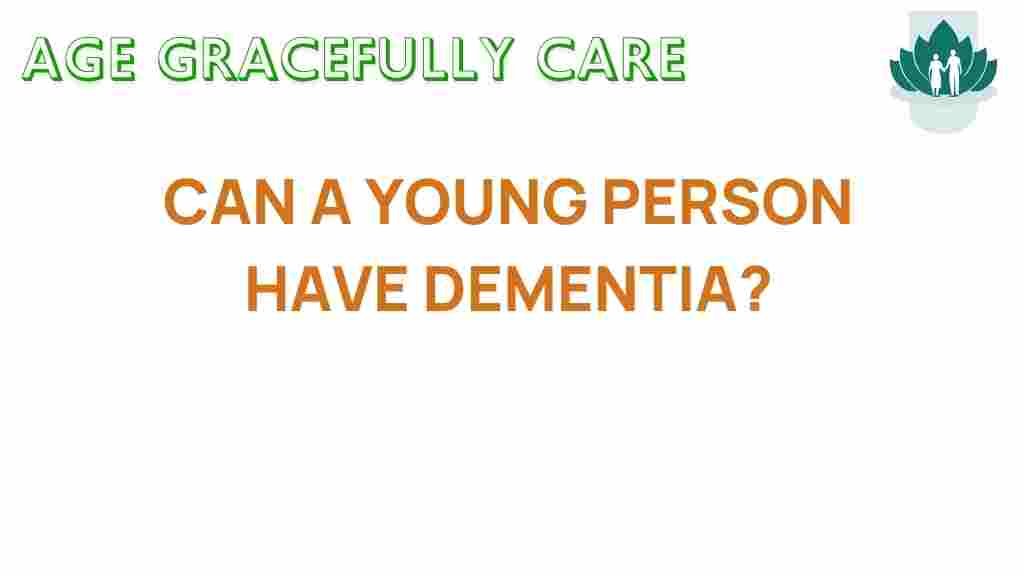Unraveling the Mystery: Can Young People Really Have Dementia?
Dementia is often associated with older individuals, leading many to believe that it’s a condition that only affects the elderly. However, the reality is more complex. Young onset dementia, which refers to dementia occurring in individuals under the age of 65, is a growing concern that requires greater awareness and understanding. In this article, we will explore the early symptoms of young onset dementia, the impact of cognitive decline, and the importance of mental health awareness in relation to this neurological disorder.
Understanding Dementia and Young Onset Dementia
Dementia encompasses a range of symptoms associated with a decline in cognitive function, affecting memory, thinking, and social abilities. While most people associate dementia with aging, young onset dementia challenges this perception, as it can affect individuals in their 30s, 40s, and 50s. This section will delve into the various types of dementia that can occur at a younger age.
- Alzheimer’s Disease: The most common type of dementia, characterized by gradual memory loss and cognitive decline.
- Frontotemporal Dementia: Involves changes in personality and behavior, often mistaken for mental health issues.
- Vascular Dementia: Results from reduced blood flow to the brain, often related to strokes.
- Lewy Body Dementia: Associated with abnormal protein deposits in the brain, leading to cognitive fluctuations and visual hallucinations.
Recognizing the Early Symptoms of Young Onset Dementia
Awareness of the early symptoms of young onset dementia is crucial for timely diagnosis and intervention. Common early symptoms may include:
- Memory Loss: Forgetting recent events, conversations, or important dates.
- Difficulty Concentrating: Struggling to focus on tasks or conversations.
- Confusion: Getting lost in familiar places or mixing up words.
- Changes in Mood and Personality: Sudden shifts in emotions or withdrawal from social activities.
- Impaired Judgment: Difficulty making decisions or managing finances.
Recognizing these early symptoms can be challenging, especially in younger individuals who may attribute these changes to stress or fatigue. However, it is vital to seek a professional evaluation if these signs persist.
The Importance of Mental Health Awareness
Mental health plays a significant role in the overall well-being of individuals experiencing cognitive decline. Many people with young onset dementia may also face mental health challenges, such as depression or anxiety. This dual impact can complicate diagnosis and treatment.
Raising awareness about the connection between mental health and dementia can help reduce stigma and encourage individuals to seek help. Support groups and therapy can provide valuable resources for both patients and their families, fostering a better understanding of their experiences.
Research on Young Onset Dementia
Recent research has highlighted the need for greater focus on young onset dementia. Studies indicate that the prevalence of dementia in younger populations is increasing, yet many healthcare professionals remain unaware of its existence. This lack of awareness can lead to misdiagnosis or delayed treatment.
Ongoing research aims to:
- Identify genetic risk factors associated with young onset dementia.
- Understand the underlying causes of cognitive decline in younger individuals.
- Develop effective interventions and treatments tailored to younger patients.
For more detailed information about current studies and advancements in research, you can visit the Alzheimer’s Association website.
Diagnosis: The Step-by-Step Process
Diagnosing young onset dementia involves a comprehensive evaluation process. Here is a step-by-step outline of what to expect:
- Initial Consultation: Schedule an appointment with a primary care physician or neurologist who specializes in cognitive disorders.
- Medical History Review: The doctor will review personal and family medical history, including any relevant symptoms.
- Cognitive Testing: A series of tests to assess memory, problem-solving skills, and cognitive abilities.
- Neurological Examination: A physical examination to evaluate motor skills, reflexes, and coordination.
- Imaging Tests: MRI or CT scans may be ordered to rule out other conditions and examine brain structure.
- Referral to Specialist: If necessary, the doctor may refer the individual to a specialist for further testing and diagnosis.
Troubleshooting Tips for Families and Caregivers
Supporting a loved one with young onset dementia can be challenging. Here are some tips for families and caregivers:
- Educate Yourself: Learn about dementia and its effects to better understand what your loved one is experiencing.
- Encourage Routine: Establish a daily routine to help provide structure and reduce confusion.
- Communicate Clearly: Use simple language and maintain eye contact to enhance communication.
- Seek Support: Join support groups for caregivers to share experiences and gain insights.
- Prioritize Self-Care: Ensure that caregivers also take time for their own mental health and well-being.
Conclusion: Advocating for Awareness and Understanding
Young onset dementia is a complex and often misunderstood condition that can significantly impact the lives of individuals and their families. By raising awareness, recognizing the early symptoms, and advocating for timely diagnosis and treatment, we can improve the quality of life for those affected.
With ongoing research and a commitment to better understanding this neurological disorder, we can foster a more supportive environment for individuals experiencing cognitive decline at a young age. If you or someone you know is facing these challenges, do not hesitate to reach out for help and support.
For further resources on dementia and mental health, consider visiting Mental Health America for valuable information and support networks.
This article is in the category Health and created by AgeGracefullyCare Team
